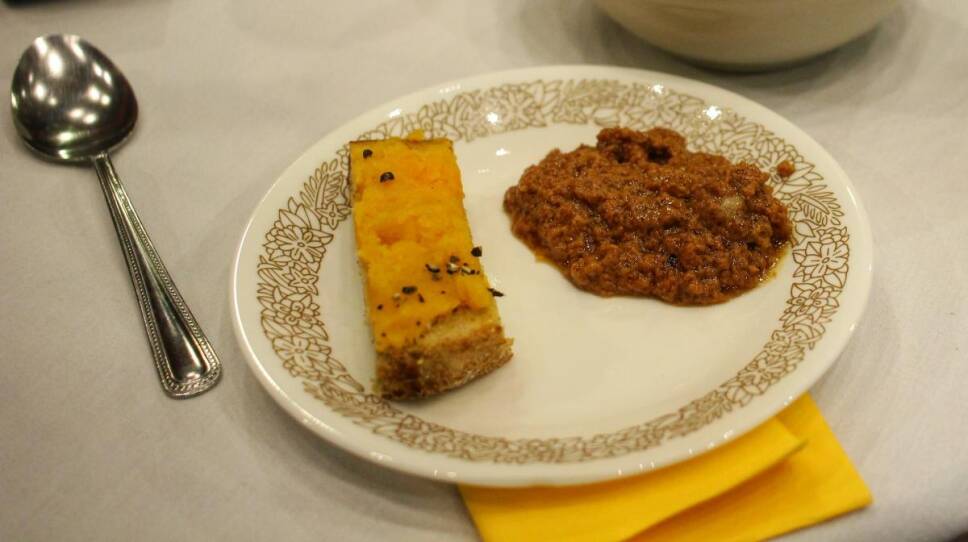Until recently, if you had asked me what life was like for the Puritans who founded Boston in 1630, I’d have painted you a pretty bleak picture: a life of hard labor and near-starvation, including having to grow all their own food and subsisting on a very limited (read: boring) diet. As it turns out, my assumptions were all wrong. They didn’t have it quite so bad.
According to Plimoth Plantation culinarian Kathleen Wall, few of the early Bostonians grew, hunted or fished for the food they put on the table. In fact, it was quite the opposite. “That frontier mentality came later,” says Wall. By 1640, you would have been able to go to the market and buy bread, butter, sugar, fish, spices and more. “There was a culture of markets and trade that took off very quickly in New England,” she explains.
Even more surprising, the food was pretty tasty back then! At a recent event titled “Repast from the Past: A Taste of 17th Century New England,” a gathering of historians and curious locals dined like the Puritans did, starting with pumpkin sops. The familiar orange squash was roasted, pureed, seasoned well with butter and spices, and served on top of sliced thirded bread (so named because it’s made with rye, wheat and corn) that had been baked at Plimoth Plantation. Wall, who gave a short lecture on the cooking and eating habits of the Puritans before the meal began, also brought a sweet, dense Indian pudding made with corn ground at the Plimoth Grist Mill.

In addition, local restaurant Loyal Nine presented a modern rendition of “pease porridge”—so delightful that people asked for seconds. “We serve ours cold,” says executive chef Marc Sheehan, “seasoned with a little turmeric.” This was topped with Cape Cod Bay mussels, marinated in sauerkraut juice with ginger, chili and husk cherries. Accompanied by a crisp and earthy buckwheat cracker, Sheehan likened it to eating chips and dip. “Doubtful that this was exactly how pease porridge was eaten back in the 1630s,” he admits, “but certainly inspired by.”
Approximately sixty people attended the sit-down tasting, which was a first for The Partnership of Historic Bostons as part of its Charter Day celebration. “The public was just so thrilled with the food,” enthused the organization’s president, Rose Doherty. “People said to me, ‘I expected this to be absolutely awful, and it was really quite lovely!’”
Every year, The Partnership of Historic Bostons commemorates Boston Charter Day with a series of events based on a particular theme. Last year, it was “survival.” This year, by popular demand, they decided on “food and drink.” But the fun isn’t over yet! Several free educational events are scheduled through the middle of next month. This includes “Stirring up the Past: Puritan Beliefs about Food” on Nov. 4, “English Puritanism and the Settlement of New England” on Nov. 13 and the “Founders Trail Tour” on Nov. 14.
If you’d like to recreate some 17th-century dishes for your family over the holidays, The Partnership of Historic Bostons has also published a recipe booklet called “The Pleasure of Taste,” available for purchase at Old North and Plimoth Plantation. Included in its pages are recipes for Narragansett succatash and sweet Indian corn pudding. The latter dish, especially topped with a dollop of whipped or ice cream, is sure to please any dinner guest (Puritans included).
For more information on Charter Day events and The Partnership of Historic Bostons, go to historicbostons.org . To learn more about Plimoth Plantation, go to plimoth.org .




